Last updated on 2024-06-21
Eugene Rousseau is a New-Orleans chess players who is well known for having played (and lost) a match against Charles Stanley in 1845.
I was very confused about his biographies on Wikipedia. According to the English version, he was born on 13 November 1805 in Saint-Denis, France, and died in Paris, France, in 1870. According to the French version, he was born on 14 November 1805 in Saint-Denis and died in Paris on 24 February 1877.
The site http://heritageechecsfra.free.fr/ says that he was born on 13 November and that he died in 1877. These claims are supported with a reference to the following death certificate (source: https://archives.paris.fr/):
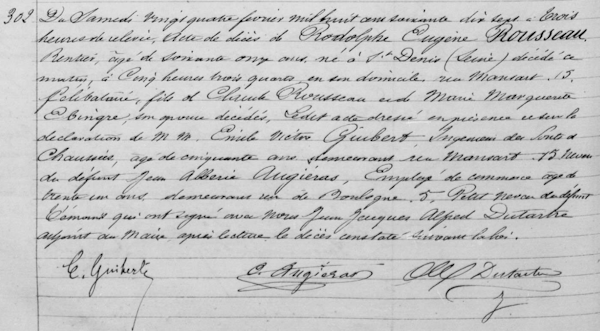
Du samedi vingt quatre février mil huit cent soixante dix sept à trois heures de relevée, acte de décès de Rodolphe Eugène Rousseau, rentier, âgé de soixante onze ans, né à St Denis (Seine) décédé ce matin, à cinq heures trois quarts en son domicile rue Mansart, 15, célibataire, fils de Claude Rousseau et de Marie Marguerite Ebingre, son épouse décédée. Ledit acte dressé en présence et sur la déclaration de MM. Emile Victor Guibert, ingénieur des Ponts et Chaussées, âgé de 50 ans, demeurant rue Mansart, 15, neveu du défunt. Jean Albéric Augiéras, employé de commerce âgé de trente un ans, demeurant rue de Boulogne, 5, petit neveu du défunt. Témoins qui ont signé avec nous, Jean Jacques Alfred Dutartre, adjoint au maire, après lecture le décès constaté devant la loi.
This site also indicates the birth certificate, which can be found here:
“France, Seine-Saint-Denis, Parish and Civil Registration, 1523-1932”, , FamilySearch (https://www.familysearch.org/ark:/61903/1:1:DRL2-P12M : Fri Nov 03 17:08:15 UTC 2023), Entry for Rodolphe Eugene Rousseau and Claude Rousseau, 14 Nov 1805.
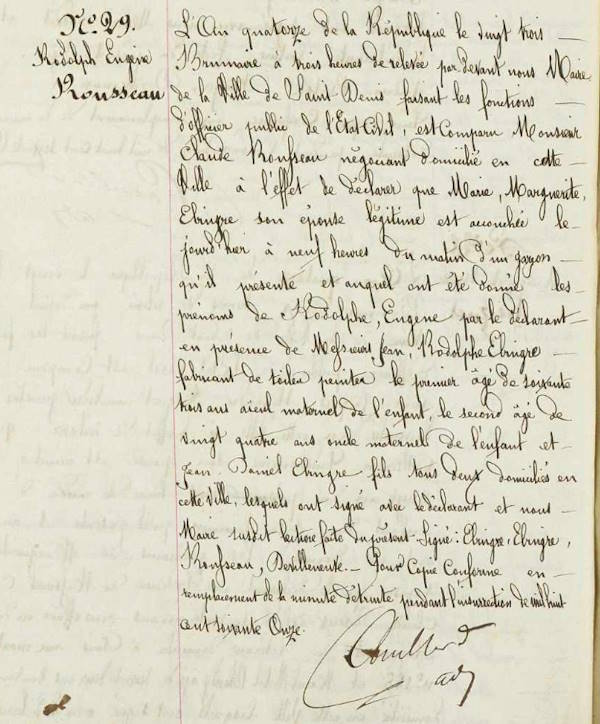
The birth certificate is dated on 23 Brumaire an quatorze, corresponding to 14th November 1805, but states that the child was born the day before, so indeed on November 13th.
So we confirmed that Rodolphe Eugène Rousseau was born on 13 November 1805 and died 24 February 1877.
But how can we be sure that Rodolphe Eugène Rousseau is indeed “our” Eugène Rousseau ? Rousseau is indeed a common French name.
The letter issued by the New Orleans chess club to Howard Staunton in February 1858 tells us that our Eugène Rousseau was cashier at the Citizens’ Bank of Louisiana. This letter is reproduced in Frederick’s Edge book on Paul Morphy, and was also published in the February 28th, 1858, issue of the New Orleans Sunday Delta, available online here: https://www.chessarch.com/excavations/excavations.php?a=1&source=New_Orleans_Sunday_Delta

Some links about the Citizens Bank of Louisiana:
- The Citizens’ Bank of Louisiana | The Historic New Orleans Collection (hnoc.org)
- THE CITIZENS BANK OF LOUISIANA: PROPERTY BANKING IN TROUBLED TIMES, 1833-1842, George D. Green
Strangely, there is a wikipedia page in French about this bank but no English version: Banque des citoyens de la Louisiane — Wikipédia (wikipedia.org)
This page states the Citizens Bank of Louisiana went bankrupt in 1843. I don’t know if it was restarted later.
I didn’t find mentions of Eugène Rousseau in these documents, but I found his name in a list of documents related to John Slidell owned by the Louisiana State Museum Historical Center and available here: https://crt.state.la.us/Assets/Museum/collections/historiccenter/manuscripts/RG_012.pdf
Eugène Rousseau was involved in correspondence about John Slidell in 1863 (there is also one reference in 1866), as listed on pages 45 – 46 of this document.
This however doesn’t help us to confirm that Rodolphe Eugène Rousseau was indeed our Rousseau.
Another document I found on FamilySearch is the 1850 New Orleans census. The reference is the following:
“United States Census, 1850”, , FamilySearch (https://www.familysearch.org/ark:/61903/1:1:MCJZ-PJD : Thu Oct 05 13:45:28 UTC 2023), Entry for Eugene Rousseau and Marguerite Barnes, 1850.

Eugène Rousseau was living with a lady called Marguerite Barnes, born in Florida circa 1815, and a girl called Eugénie Rousseau, born circa 1837 in Louisiana. Both Marguerite and Eugénie are both indicated as mulatto. Is it possible that Eugène Rousseau married Marguerite Barnes and that they had a daughter called Eugénie ? I tried to search the Louisiana vital records but without any success yet.
The most interesting document I found, still on FamilySearch is the following request for a passport:
“United States Passport Applications, 1795-1925”, , FamilySearch (https://www.familysearch.org/ark:/61903/1:1:QKNT-6S7M : Wed Nov 01 02:43:47 UTC 2023), Entry for R Eugene Rousseau, 22 May 1856.
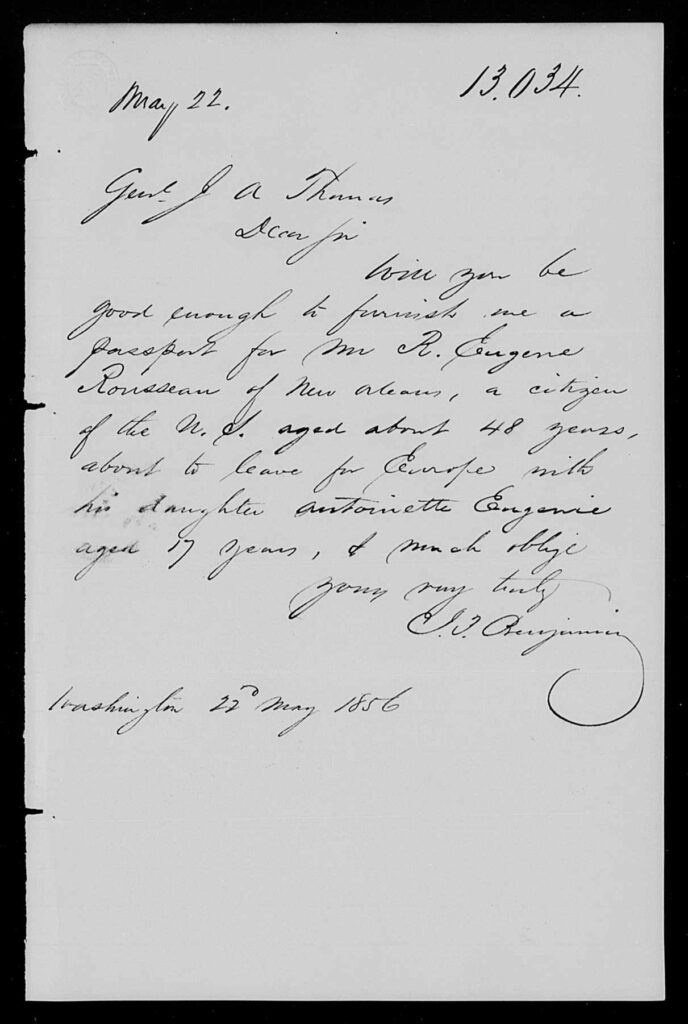
Will you be good enough to furnish me a passport for Mr. R. Eugene Rousseau of New Orleans, a citizen of the [? US ?] aged about 48 years, about to leave for Europe with his daughter Antoinette Eugenie aged 17 years […]
Here we learn that Eugénie had a second first name, Antoinette, that she was perhaps born in 1839. But, more importantly, we learn that Eugène Rousseau of New Orleans was actually R. Eugène Rousseau. That is a first link with Rodolphe Eugène Rousseau !
I found a second link by searching for obituaries in New Orleans newspapers. The chessgames page on Eugene Rousseau claims that there is an obituary in the New Orleans Daily Picayune issue of March 21st, 1877, but I haven’t found this newspaper yet.
However, there was also a mention of Rousseau’s death in the the New Orleans daily Democrat, on the same day:
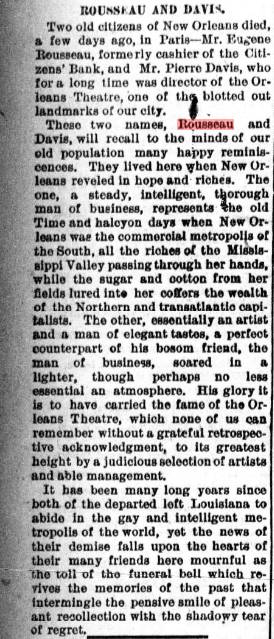
This confirms that Eugene Rousseau, cashier of the Citizens’ bank is probably indeed the Rousseau that died in Paris in 1877. We learn that he departed many long years ago to Paris.
Eugene Rousseau in Paris
Do we know when and why Eugène Rousseau travelled to Paris ?
In the June 1843 issue of Le Palamède (page 283 of the 1843 collection), one reads:
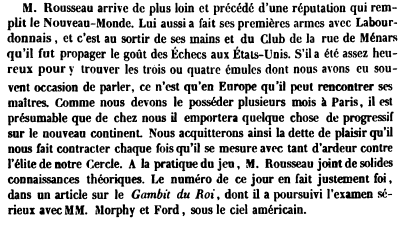
M. Rousseau arrive de plus loin et précédé d’une réputation qui remplit le Nouveau-Monde. Lui aussi a fait ses premières armes avec Labourdonnais, et c’est au sortir de ses mains et du club de la rue de Ménars qu’il fut propager le goût des Echecs aux Etats-Unis. S’il a été assez heureux pour y trouver les trois ou quatre émules dont nous avons eu souvent occasion de parler, ce n’est qu’en Europe qu’il peut rencontrer ses maîtres. Comme nous devons le posséder plusieurs mois à Paris, il est présumable que de chez nous il emportera quelque chose de progressif sur le nouveau continent. Nous acquitterons ainsi la dette de plaisir qu’il nous fait contracter chaque fois qu’il se mesure avec tant d’ardeur contre l’élite de notre Cercle. A la pratique du jeu, M. Rousseau joint de solides connaissances théoriques. Le numéro de ce jour en fait justement foi, dans un article sur le Gambit du Roi, dont il a poursuivi l’examen sérieux avec MM. Morphy et Ford, sous le ciel américain.
Mr Rousseau arrives from further away [as compared to other players mentioned in the article] and preceded by a reputation which fills the New World. He also made his first weapons with Labourdonnais, and it is from his hands and the club of the street of Ménars that he was propagating the taste of Chess in the United States. If he was fortunate enough to find there the three or four emulators of which we often had occasion to speak, it is only in Europe that he can meet his masters. As we shall have him for several months in Paris, it is to be presumed that he will take something progressive with him to the new continent. In this way, we will repay the debt of pleasure he causes us each time he competes with such ardour against the elite of our Cercle. In addition to his practical knowledge of the game, Mr Rousseau has a sound theoretical background. Today’s issue bears witness to this in an article on the King’s Gambit, the serious examination of which he pursued with MM. Morphy and Ford under the American sky.
- Le Palamede 1843, p 349: game Chamouillet – Rousseau played on 19th July
In summer 1843, Rousseau plays a match against Saint-Amant (September issue of Le Palamede, (page 427 of the 1843 collection):
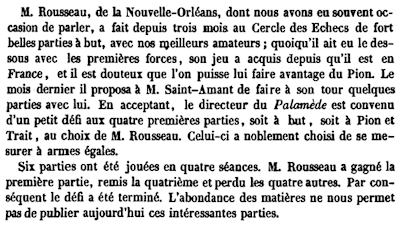
The games were played on the 26 August, 27 August and 3 September. Four games are given page 451.
In March 1844, Rousseau plays a match against Lecrivain. One game played on the 5th or March 1844 is given on page 119 of the 1844 volume of Le Palamede. In the same issue, page 138, one reads:

At more or less the same period, Rousseau plays against Mr Goldsmid, from Gent, as mentioned in the April issue (page 186).
Rousseau finally leaves Paris at the end of 1844 (December issue, page 557):

Eugene Rousseau was thus in Paris from mid 1843 to end 1844.
On his way back to New Orleans, he stops in London where he plays one game against Walker and two against Perigal (Le Palamede, January 1845, page 41):

Leaving Paris, Mr. Rousseau crossed into England and embarked for New Orleans. He successively held a session with each of the honorable secretaries of the two chess clubs at Polytechnic institution and the City, Messrs. G. Walker and G. Perigal. A single game was played with the former, which lasted five hours and was drawn. Mr. Rousseau won one game and lost the other with Mr. Perigal.
In December 1845, he plays in New Orleans his famous match against Stanley, losing with the score of +8 =8 -15.
On Saturday, June 8th 1850, Eugene Rousseau buys the house located at 618-620 Dauphine Street from the Merchants’ Insurance Company. He sells this house three years later, on Wednesday, May 11th 1853, to Charles Lesseps.
In October 1856, Rousseau is registered as a participant to a chess tournament in café de la Régence (La Régence 1856, page 290).
From Frederick Edge’s book, we know that Eugène Rousseau was in Paris in September 1858, when Paul Morphy arrived at Café de La Régence. Frederick Edge tells us (page 177 of the New York edition):

Then we found there such players as Mr. Eugene Rousseau, of New Orleans, on a visit to his family in Paris, and who had been so much “at home” in the café in other years. How proud he was of the fame and feats of his young fellow-townsman amidst the Gallic paladins !
Actually, Eugene Rousseau was already with Morphy in London (from New York Times, August 5th, 1858):
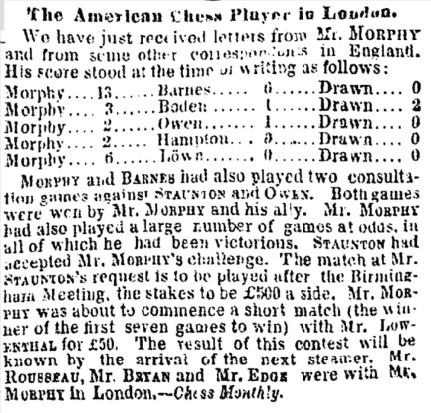
I don’t know however when Rousseau left Paris to go back to New-Orleans.
Finally, Eugène Rousseau participated to the tournament organized in Paris in 1867. The following information is taken from the book of the congress published in 1868, entitled Congrès International des Echecs, compte-rendu du congrès de 1867 et des congrès d’échecs antérieurs, by Alphonse Féry d’Esclands, available online here: https://books.google.fr/books?id=TzACAAAAYAAJ
Eugène Rousseau started the tournament by losing against Neumann on the 5th of June and ended the tournament by winning against Winawer on the 6th of July.
To be continued…

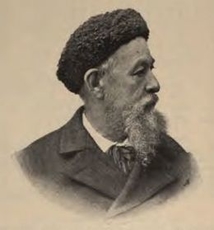
Be First to Comment